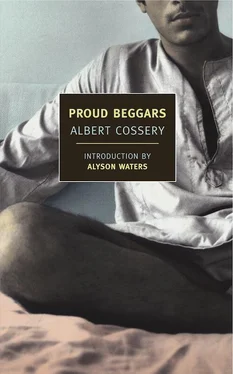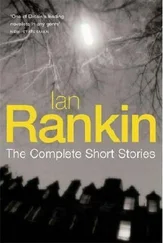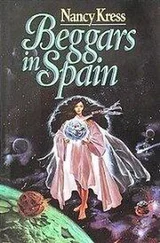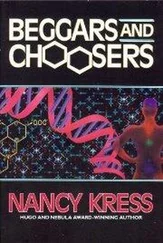“What money?” he said bewilderedly.
“What! You don’t know what money?”
“Oh yes, of course. Excuse me, I’m a little dizzy.”
Despite all her sensual power, Arnaba had never believed that her charms could drive a man to this point; her vanity incited her to increase her advantage. The afternoon was turning out more enjoyable than a carriage ride with Set Amina and the girls. For a moment she had been sorry to have missed that outing; now she had found something better. She edged closer to Gohar, leaned her head on his shoulder as if to decipher the letter, and caressed his knee with an expert hand. As his limbs shook, she saw that he could not hold out much longer; she began to laugh, a nervous, childish laugh.
“You write well,” she said. “I see you’ve been to school.”
He answered without looking at her.
“Yes. Didn’t you go to school?”
“Why should I go to school?” Arnaba said sarcastically. “I’m a whore. With a nice ass, who needs to know how to write?”
“I agree,” Gohar said. “I’ve never heard it put so well.”
“You’re always making fun of me. But that’s all right, I think you’re sweet.”
Strangely enough, as the danger became more precise, its imminence made it seem unreal. A kind of torpor took hold of Gohar. Surrendering to his fascination with the gold bracelets, he no longer reacted to the girl’s touch. In his eyes, the bracelets had acquired an immaterial value; they had come to symbolize the drugs of which he had been deprived since morning.
He hastily finished the letter.
“You know how to sign your name?”
“No,” said the girl. “Just write my name. It’s Arnaba.”
“I know,” said Gohar. “It’s a pretty name.”
He signed the letter, asked her for her uncle’s address, and wrote it on the envelope. Now it was done; he could go, escape this morbid temptation.
“Here’s the letter,” he said.
“Thank you. Keep it and mail it for me. I’ll give you money for the stamp.”
Gohar still didn’t dare move, held by some unknown, pernicious bonds. He was frightened to death by the jingling of her bracelets; his whole being was tense with the fear of that ominous sound. For a moment he suspected she was making those careless movements with her arms on purpose. Had she noticed something? No, for she would have roused the whole neighborhood with her cries; she wasn’t strong enough to enjoy that game.
Arnaba rose first; she crossed the bedroom, broke out laughing, then came back to Gohar and said, “You can sleep with me, if you want.”
He felt like he was drowning, as in this morning’s dream, and that the tumultuous waves of the river in full spate were swallowing him in their depths. He desperately tried to remain afloat, to save a scrap of lucidity. It was hopeless. Nothing remained of his immeasurable desire for peace. Only his savage wish to steal the bracelets resisted the collapse of his consciousness. In his hallucination, he caught a glimpse of vast fields of hashish spread out under the immensity of the sky beyond the bracelets. The vision was so sharp, so pressing, that Gohar stopped breathing. He dreamt he was going to commit a crime, and it seemed simple and easy. Yes, he had to kill this girl; he saw no other way to get the bracelets. This certainty filled him with a dreadful calm.
The young prostitute’s face betrayed her uneasiness; she was no longer smiling. For the first time, she looked at Gohar suspiciously. These signs of a desire that she did not understand began to appear suspect. But her anxiety didn’t last long. With a skillful languor, she removed her dressing gown, threw it on the chair, and stood stark naked before Gohar’s bewildered eyes. She drew near and took him by the arm in an attempt to lead him to bed.
“Come on. Let’s go, quickly.”
Gohar pulled away violently; the clash of the girl’s bracelets sounded like thunder, and he felt his heart stop beating. A cold sweat bathed his limbs. He shivered, jumped up, dragged the girl to the bed, and fell on top of her. His hands had gripped her by the throat before she had time to cry out. She opened her big eyes filled with surprise; she still hadn’t realized what was happening. Gohar couldn’t bear her gaze and turned his head away. He pressed his fingers with all his wavering strength. In a final effort to defend herself, the girl stretched her legs out in front of her. Gohar closed his eyes. There was a long silence full of shadows as Gohar gradually loosened his grip. The girl’s head fell softly back on the eiderdown; she was dead.
He stood up painfully, gasping for breath. Arnaba’s naked body sprawled across the bed in a ridiculous, obscene pose. Now he had to free the bracelets, and that was the worst part of this demented enterprise. Gohar raised her arm, took one of the bracelets, and began to slide it over her wrist. At the same time, he received a shock, his consciousness suddenly returned, and he uttered a little disjointed cry, like a death rattle.
He had just noticed something extraordinary: the gold bracelets were only cheap trash. They had never been gold, and Gohar had always known that. Even a child would have known that, he thought. How could he have made such a gross error? He couldn’t understand it. These bracelets were maybe worth a few piasters, and he had murdered to get them.
He was now very calm. The shock of his mistake had completely sobered him. He left the corpse, picked up his tarboosh which had rolled onto the bed, put the letter in his pocket, and headed for the door. The waiting room was still dark and deserted. Apparently no one had come in all this time. Gohar slowly descended the steps, entered the street with no apprehension, and casually greeted a passerby he didn’t know, out of simple courtesy.
Throughout this whole adventure, he hadn’t found Yeghen. Where was Yeghen hiding? This question troubled him for a long time.
THE KEROSENE lamp spread its parsimonious light just to the table’s edge. With his myopic gaze, Yeghen tried to make out his mother’s shadowed face; he could see only her old withered hands busily mending a man’s shirt: no doubt some job for a bourgeois family in town. The mediocrity of this thankless task irritated him like a personal insult, especially since she worked so hard to make it sad. What gravity, what seriousness in her gestures, as if they involved the creation of a better, mysterious world! By this humble task, she seemed to want to lend credibility to the myth of respectable poverty. What a sham!
Yeghen laughed. What made him study his mother’s face this evening? It was an idiotic, unhealthy idea. For a moment, across the years and wrinkles of his mother’s face, he struggled to find a resemblance to his own. He opened his eyes wide and scrutinized the shadows outside the lamp’s circle of light: nothing. His mother’s face remained an enigma. He searched his memory trying to recall her features; it was impossible to summon up a good image. A black hole. It was as if he had never looked at her during all these years. He grew exasperated before the absolute abyss of his memory, wanting to ask her to lean toward the light a little, but he refrained. He didn’t want to trouble her needlessly. He even felt a wave of generosity toward her. “She must have been very beautiful. I must take after my father.” He had no memory of his father either. All the same, it was strange! It now seemed to him that he had never seen up close these people who had brought him into the world and with whom he had lived for years.
But why was he particularly preoccupied with his ugliness this evening? Usually he never even glanced in a mirror. He was afraid, he admitted to himself, that he might frighten himself accidentally. Again, he laughed. The bastards! With what fury they continued to mock him in the newspapers and literary reviews of the capital. He had become the laughingstock of the entire cultivated Orient. Those infamous journalists never missed a shot at him; they undoubtedly received a bonus each time they featured his ugliness in their venomous articles. And that bastard cartoonist who had published a drawing of Yeghen with the caption “Condensed Ugliness.” Yeghen found these attacks remarkably weak, at best worthy of little children. Did these imbeciles seriously think they could upset him with such idle chatter? They didn’t know him; his ugliness was a real force of nature.
Читать дальше












